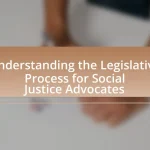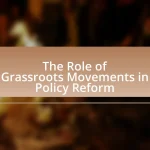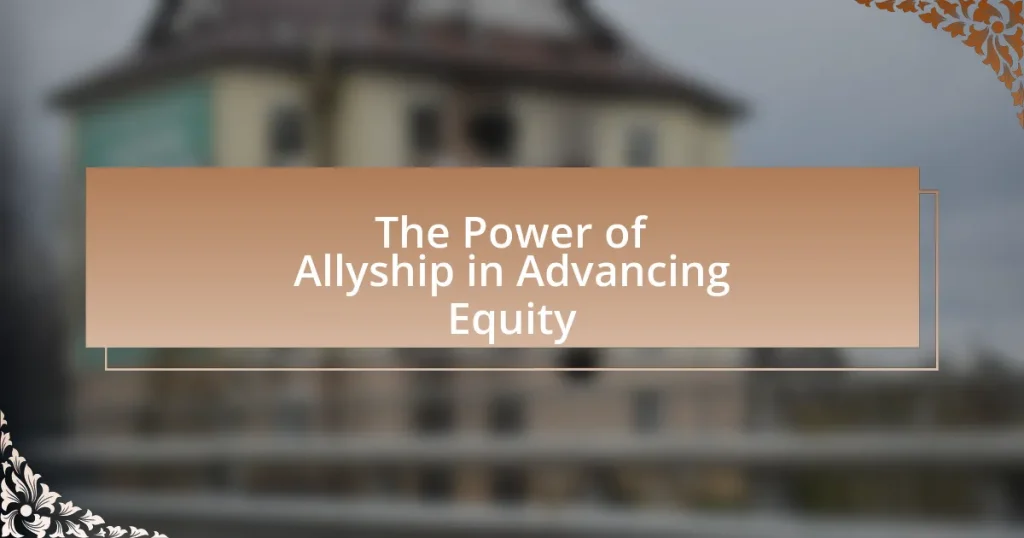The article focuses on the power of allyship in advancing equity, emphasizing its role in amplifying marginalized voices and fostering inclusive environments. It outlines how effective allyship contributes to social equity through advocacy, resource sharing, and active support for underrepresented groups. Key principles of allyship, such as active listening and continuous learning, are discussed alongside the challenges and misconceptions that can hinder progress. The article also highlights practical steps for individuals to become effective allies, including education, advocacy, and maintaining accountability, ultimately demonstrating how allyship can drive meaningful change in diverse communities and organizations.

What is the Power of Allyship in Advancing Equity?
The power of allyship in advancing equity lies in its ability to amplify marginalized voices and foster inclusive environments. Allies actively support underrepresented groups by leveraging their privilege to challenge systemic inequalities, thereby creating pathways for equitable opportunities. Research indicates that organizations with strong allyship practices experience increased employee engagement and retention, as seen in a 2020 study by Catalyst, which found that inclusive workplaces lead to 2.3 times higher cash flow per employee. This demonstrates that allyship not only benefits individuals but also enhances organizational performance and societal equity.
How does allyship contribute to social equity?
Allyship contributes to social equity by actively supporting marginalized groups in their pursuit of equal rights and opportunities. This support manifests through advocacy, resource sharing, and amplifying the voices of those who are often silenced. For instance, research from the American Psychological Association indicates that allyship can lead to increased representation and participation of underrepresented communities in decision-making processes, which is essential for achieving social equity. By fostering inclusive environments and challenging systemic inequalities, allies help dismantle barriers that perpetuate discrimination and inequity.
What are the key principles of effective allyship?
The key principles of effective allyship include active listening, amplifying marginalized voices, taking responsibility for one’s own privilege, and committing to continuous learning and action. Active listening ensures that allies understand the experiences and needs of marginalized groups, while amplifying their voices helps to elevate their perspectives in discussions. Taking responsibility for one’s privilege involves recognizing how systemic inequalities affect others and using that awareness to advocate for change. Continuous learning and action demonstrate a commitment to allyship by staying informed about social justice issues and actively participating in efforts to dismantle oppression. These principles are essential for fostering an inclusive environment and advancing equity.
How can allyship address systemic inequalities?
Allyship can address systemic inequalities by actively supporting marginalized groups through advocacy, education, and resource sharing. When allies use their privilege to amplify the voices of those affected by systemic injustices, they help dismantle barriers that perpetuate inequality. For instance, research from the American Psychological Association indicates that allyship can lead to increased representation and improved outcomes for marginalized communities, as allies can influence policies and practices within organizations. By fostering inclusive environments and challenging discriminatory practices, allyship plays a crucial role in promoting equity and social justice.
Why is allyship important in diverse communities?
Allyship is important in diverse communities because it fosters inclusion and equity by amplifying marginalized voices and addressing systemic inequalities. When individuals from privileged backgrounds actively support and advocate for those facing discrimination, they help create a more equitable society. Research indicates that allyship can lead to improved social cohesion and reduced disparities; for example, a study by the American Psychological Association found that inclusive practices in workplaces enhance employee satisfaction and productivity. Thus, allyship not only benefits marginalized groups but also strengthens the overall community by promoting understanding and collaboration.
What role does allyship play in amplifying marginalized voices?
Allyship plays a crucial role in amplifying marginalized voices by providing support, visibility, and resources that these groups often lack. Allies use their privilege to create platforms for marginalized individuals, ensuring their perspectives are heard and valued in discussions that affect them. For instance, research by the American Psychological Association highlights that allyship can lead to increased representation of marginalized groups in decision-making processes, thereby enhancing their influence and agency. This dynamic not only fosters a more inclusive environment but also challenges systemic inequalities, making allyship an essential component in the pursuit of equity.
How can allyship foster inclusive environments?
Allyship fosters inclusive environments by actively supporting marginalized groups, which enhances their visibility and participation. When allies advocate for equitable policies and practices, they create spaces where diverse voices are heard and valued. Research shows that organizations with strong allyship initiatives report higher employee satisfaction and retention rates, as seen in a 2020 study by McKinsey & Company, which found that inclusive teams are 1.7 times more likely to be innovative and 1.8 times more likely to be change-ready. This demonstrates that allyship not only promotes a sense of belonging but also drives organizational success through diversity.

What are the challenges faced in practicing allyship?
Practicing allyship faces several challenges, including resistance from those in privileged positions, misunderstanding of allyship roles, and the emotional labor involved. Resistance occurs when individuals in power feel threatened by the changes that allyship promotes, leading to pushback against equity initiatives. Misunderstanding arises when allies do not fully grasp their role, often leading to performative actions rather than genuine support. Emotional labor is significant, as allies may experience fatigue or frustration when advocating for marginalized groups, especially in environments that are not supportive. These challenges can hinder effective allyship and the overall advancement of equity.
What common misconceptions exist about allyship?
Common misconceptions about allyship include the belief that it is solely about being supportive without taking action, that it is a one-time effort rather than an ongoing commitment, and that allies can speak over marginalized voices instead of amplifying them. These misconceptions undermine the effectiveness of allyship, as true allyship requires active participation, continuous learning, and a focus on elevating the experiences and perspectives of those being supported. For instance, research by the American Psychological Association highlights that effective allyship involves understanding systemic inequalities and actively working to dismantle them, rather than merely expressing support.
How can these misconceptions hinder progress toward equity?
Misconceptions about equity can significantly hinder progress by perpetuating stereotypes and reinforcing systemic inequalities. For instance, the belief that equity means treating everyone the same ignores the unique challenges faced by marginalized groups, leading to policies that fail to address their specific needs. This misunderstanding can result in inadequate resource allocation, as seen in educational funding disparities, where schools in low-income areas receive less support, further entrenching inequality. Additionally, misconceptions can foster resistance to necessary changes, as individuals may perceive equity initiatives as unfair advantages rather than essential corrections to historical injustices. This resistance can stall or completely derail efforts aimed at creating a more equitable society.
What are the risks of performative allyship?
Performative allyship poses several risks, including the potential to undermine genuine advocacy efforts and perpetuate systemic inequalities. When individuals engage in performative allyship, they often prioritize visibility over meaningful action, which can lead to a false sense of progress. This superficial engagement can alienate marginalized communities, as they may feel exploited for the ally’s personal gain or social capital. Additionally, performative allyship can dilute the urgency of social justice issues, as it may create an illusion of support without contributing to tangible change. Research indicates that actions lacking authenticity can lead to skepticism and distrust among those who are directly affected by the issues at hand, further complicating efforts to achieve equity.
How can individuals overcome barriers to effective allyship?
Individuals can overcome barriers to effective allyship by actively educating themselves about the experiences and challenges faced by marginalized groups. This self-education fosters empathy and understanding, which are crucial for meaningful support. Research indicates that individuals who engage in continuous learning about social justice issues are more likely to take informed actions that benefit marginalized communities. For example, a study by the American Psychological Association found that awareness of systemic inequalities enhances individuals’ commitment to allyship behaviors. By prioritizing education, individuals can dismantle their biases and become more effective allies.
What skills are necessary for becoming a better ally?
To become a better ally, individuals must develop skills such as active listening, empathy, and advocacy. Active listening enables allies to understand the experiences and needs of marginalized groups, fostering deeper connections. Empathy allows allies to relate to the struggles faced by others, promoting a supportive environment. Advocacy involves speaking up against injustices and using one’s privilege to amplify marginalized voices. Research indicates that effective allyship can significantly impact social equity, as allies who actively engage in these skills contribute to systemic change and support the empowerment of underrepresented communities.
How can allies educate themselves on issues of equity?
Allies can educate themselves on issues of equity by actively engaging with diverse perspectives through reading, attending workshops, and participating in community discussions. For instance, reading books such as “How to Be an Antiracist” by Ibram X. Kendi and “White Fragility” by Robin DiAngelo provides foundational knowledge on systemic racism and privilege. Additionally, attending workshops led by organizations focused on equity, such as the Race Forward or the American Association of University Professors, offers practical tools and insights. Engaging in community discussions, particularly those that include marginalized voices, fosters understanding and empathy, which are crucial for effective allyship.

What are the practical steps to becoming an effective ally?
To become an effective ally, individuals should actively listen to marginalized voices, educate themselves about systemic inequalities, and advocate for equitable policies. Active listening involves engaging with the experiences and perspectives of those from underrepresented communities, which fosters understanding and empathy. Education on systemic inequalities can be achieved through reading literature, attending workshops, and participating in discussions that highlight social justice issues. Advocacy for equitable policies can include supporting legislation that addresses discrimination and participating in community initiatives that promote inclusivity. These steps are supported by research indicating that allyship significantly contributes to social change and equity, as seen in studies by the American Psychological Association, which emphasize the importance of informed advocacy in dismantling systemic barriers.
How can allies actively support marginalized communities?
Allies can actively support marginalized communities by amplifying their voices and advocating for their rights. This involves listening to the experiences and needs of marginalized individuals, sharing their stories in broader platforms, and using one’s privilege to challenge systemic inequalities. For instance, research from the American Psychological Association indicates that allyship can lead to increased visibility and support for marginalized groups, fostering an environment where their issues are recognized and addressed. By participating in protests, supporting inclusive policies, and educating oneself and others about social justice issues, allies can contribute to meaningful change and solidarity.
What actions can allies take to promote equity in their workplaces?
Allies can promote equity in their workplaces by actively advocating for inclusive policies and practices. This includes supporting diverse hiring initiatives, ensuring equitable pay, and creating mentorship programs for underrepresented groups. Research shows that organizations with diverse leadership are 33% more likely to outperform their peers in profitability, highlighting the importance of equitable practices. Additionally, allies can facilitate open dialogues about equity, challenge discriminatory behaviors, and participate in training programs that raise awareness about systemic biases. These actions contribute to a more inclusive workplace culture, ultimately benefiting both employees and the organization as a whole.
How can allies engage in community advocacy?
Allies can engage in community advocacy by actively supporting marginalized groups through education, resource sharing, and participation in local initiatives. For instance, allies can educate themselves about the issues faced by these communities, which enables them to advocate effectively. Additionally, they can share resources such as funding opportunities or information about local services that benefit marginalized populations. Participation in community events, such as town hall meetings or advocacy campaigns, allows allies to amplify the voices of those they support, demonstrating solidarity and commitment to equity. Research shows that active allyship can lead to increased awareness and policy changes that benefit underrepresented communities, as seen in various social movements throughout history.
What resources are available for allies seeking to improve their practice?
Allies seeking to improve their practice can access a variety of resources, including training programs, literature, and online platforms. Training programs such as workshops and webinars offered by organizations like the Human Rights Campaign and the National LGBTQ Task Force provide practical skills and knowledge. Literature, including books like “How to Be an Antiracist” by Ibram X. Kendi and “White Fragility” by Robin DiAngelo, offers insights into systemic issues and personal reflection. Online platforms, such as the Allyship Toolkit and the Racial Equity Tools website, provide guides, articles, and community forums for ongoing learning and support. These resources collectively enhance allies’ understanding and effectiveness in promoting equity.
Which organizations provide training and support for allies?
Organizations that provide training and support for allies include the Human Rights Campaign, the National LGBTQ Task Force, and the Southern Poverty Law Center. These organizations offer resources, workshops, and educational programs aimed at equipping allies with the knowledge and skills necessary to support marginalized communities effectively. For instance, the Human Rights Campaign provides comprehensive training modules on LGBTQ+ advocacy, while the Southern Poverty Law Center focuses on combating hate and promoting tolerance through allyship training.
What literature can deepen understanding of allyship and equity?
Literature that can deepen understanding of allyship and equity includes “How to Be an Antiracist” by Ibram X. Kendi, which explores the intersection of race and policy, emphasizing the importance of active allyship in combating systemic racism. Additionally, “The Will to Change: Men, Masculinity, and Love” by bell hooks examines how traditional notions of masculinity can hinder allyship and equity, advocating for emotional openness and vulnerability. “So You Want to Talk About Race” by Ijeoma Oluo provides practical guidance on discussing race and fostering allyship, making it accessible for a broad audience. These works collectively offer insights into the complexities of allyship and the necessity of equity in social justice movements.
What are the best practices for sustaining allyship over time?
To sustain allyship over time, individuals must engage in continuous education and active listening. Continuous education involves staying informed about the issues faced by marginalized communities, which can be achieved through reading, attending workshops, and participating in discussions. Active listening requires allies to genuinely hear and understand the experiences and needs of those they support, fostering trust and collaboration.
Moreover, allies should regularly check in with the communities they support, ensuring that their actions align with the evolving needs and priorities of those communities. This practice not only demonstrates commitment but also allows for adaptive strategies that reflect real-time feedback.
Additionally, allies must be willing to confront their own biases and privileges, which can be facilitated through self-reflection and seeking feedback from those they aim to support. This ongoing process of self-awareness is crucial for maintaining credibility and effectiveness as an ally.
Research indicates that sustained allyship leads to more significant social change, as consistent support amplifies marginalized voices and fosters a culture of inclusion. Therefore, implementing these best practices is essential for effective and lasting allyship.
How can allies maintain accountability in their actions?
Allies can maintain accountability in their actions by actively seeking feedback from marginalized communities and committing to ongoing education about systemic inequalities. This approach ensures that allies remain informed and responsive to the needs and perspectives of those they aim to support. Research indicates that effective allyship involves not only listening but also taking tangible actions based on that feedback, such as advocating for policy changes or amplifying marginalized voices in decision-making processes. By establishing transparent communication channels and regularly reflecting on their impact, allies can demonstrate their commitment to accountability and foster trust within the communities they support.
What strategies can allies use to foster ongoing dialogue about equity?
Allies can foster ongoing dialogue about equity by actively listening to marginalized voices and creating safe spaces for discussion. This approach encourages open communication and ensures that diverse perspectives are heard, which is essential for understanding the complexities of equity issues. Research indicates that organizations that prioritize inclusive dialogue see improved collaboration and innovation, as diverse viewpoints contribute to more comprehensive solutions. For instance, a study by the Harvard Business Review found that teams with diverse members are 35% more likely to outperform their peers, highlighting the importance of inclusive conversations in driving equity forward.










